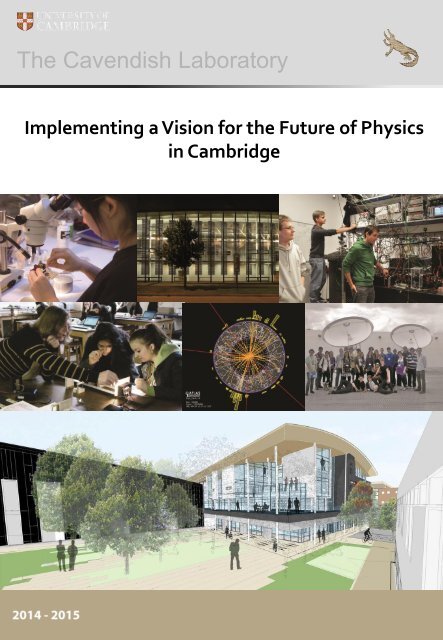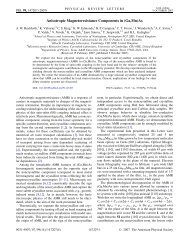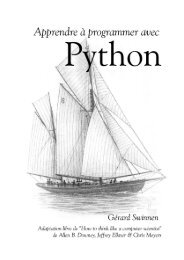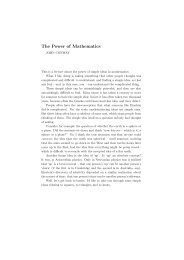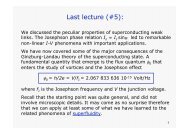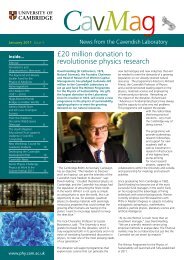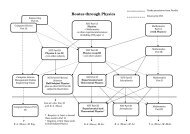The Cavendish Development Portfolio - Cavendish Laboratory
The Cavendish Development Portfolio - Cavendish Laboratory
The Cavendish Development Portfolio - Cavendish Laboratory
Create successful ePaper yourself
Turn your PDF publications into a flip-book with our unique Google optimized e-Paper software.
<strong>The</strong> <strong>Cavendish</strong> <strong>Laboratory</strong><br />
Implementing a Vision for the Future of Physics<br />
in Cambridge
<strong>The</strong> <strong>Cavendish</strong> <strong>Laboratory</strong><br />
Overview<br />
This document summarises the exciting initiatives which constitute the <strong>Cavendish</strong> <strong>Laboratory</strong>’s <strong>Development</strong><br />
Programme. It is the result of many discussions with colleagues in the Department, with the Cambridge University<br />
<strong>Development</strong> and Alumni Relations, with the School of the Physical Sciences and benefactors to the Department.<br />
<strong>The</strong> <strong>Development</strong> Programme arises from a document produced about twelve years ago and approved by the<br />
School of Physical Science and the University concerning the long-term redevelopment of the <strong>Cavendish</strong><br />
<strong>Laboratory</strong>. While the main thrust of that document was a plan for rebuilding the <strong>Laboratory</strong>, at the same time the<br />
University’s 800 th Anniversary Campaign focused our attention upon the importance of seeking, in parallel,<br />
resources for studentships, fellowships, funding of university posts, outreach to the community and so on.<br />
Since we began, we have had a number of notable successes in implementing the Programme. <strong>The</strong> Physics of<br />
Medicine Building, the Kavli Centre for Cosmology in Cambridge, the Winton Programme, the Battcock Centre for<br />
Experimental Astrophysics and the forthcoming Maxwell Centre are prominent highlights of the activities over the<br />
last seven years and set the pattern for the development of the large-scale infrastructure of the <strong>Laboratory</strong>.<br />
<strong>The</strong> various projects outlined in this document span the complete range of activity within the <strong>Laboratory</strong> and are<br />
presented in order of increasing cost. But, it must be emphasised that gifts and benefactions at all levels are of<br />
enormous value to the Department. Thus, in the first few project sheets, small gifts can make an enormous<br />
difference to our ability to help students and to trying out speculative pioneering research initiatives.<br />
We have grouped the <strong>Development</strong> areas into four themes:<br />
• Support for people and their programmes<br />
• Endowment of Professorships<br />
• Equipment<br />
• Buildings and Infrastructure<br />
Please contact us, or the contact person listed in each sheet if we can provide more details about each programme.<br />
Andy Parker<br />
Head of <strong>Cavendish</strong> <strong>Laboratory</strong><br />
Professor of High Energy Physics<br />
Malcolm Longair CBE FRS FRSE<br />
Director of <strong>Development</strong><br />
Emeritus Jacksonian Professor of Natural<br />
Philosophy
<strong>The</strong> <strong>Cavendish</strong> <strong>Laboratory</strong><br />
Support for people and their programmes
<strong>The</strong> <strong>Cavendish</strong> <strong>Laboratory</strong><br />
Physics Research Support Fund<br />
Pump-Priming the Next Generation of Physics Research<br />
Many of the great discoveries in physics have come from speculative<br />
experiments carried out on the inspiration of individuals, often running<br />
counter to the conventional majority view. <strong>The</strong> ability to encourage<br />
research physicists at all stages in their careers, but especially early on, to<br />
attempt bold and innovative research is at the heart of some of physics<br />
greatest triumphs. For example, Lawrence Bragg discovered Bragg’s Law of<br />
Diffraction as a first year graduate student.<br />
To facilitate this key aspect of the Department’s research, a physics research<br />
support Fund has been set up, bringing together existing funds within the<br />
Department and providing a simple means for benefactors to contribute to the<br />
research work of the Department at a wide range of levels. Very often, small<br />
amounts of investment can have a quite disproportional benefit in testing out<br />
ideas that cannot attract funding from traditional funding sources. <strong>The</strong><br />
guidelines for the operation of the Fund are as follows:<br />
• A Board of Managers, chaired by the Head of the <strong>Cavendish</strong> <strong>Laboratory</strong> and<br />
involving senior members of the Department, is responsible for the proper<br />
management of the Fund.<br />
• <strong>The</strong> capital and income of the Fund will be used to provide unrestricted<br />
grants to support the research in the <strong>Cavendish</strong> <strong>Laboratory</strong>. This might be in<br />
the form of fellowships, the provision of equipment or any other means of<br />
supporting innovative research within the <strong>Laboratory</strong>.<br />
• <strong>The</strong>re is no restriction upon the areas of physics research that can be<br />
supported by the Fund. <strong>The</strong> emphasis is on innovation and interdisciplinary<br />
areas where new concepts can be exploited.<br />
Donations of all sizes can make a difference. <strong>The</strong> Department would be<br />
pleased to discuss naming opportunities in recognition of a major contribution<br />
to the Fund.<br />
High resolution image of a surface<br />
section of a scale of the Indonesian<br />
‘Green Swallowtail’ butterfly in<br />
unpolarised light (left) and with the<br />
scale placed between crossed<br />
polarisers (right).<br />
Head of the <strong>Cavendish</strong>: Professor Andy Parker<br />
Andy Parker is Professor of High Energy Physics and Professorial Fellow of Peterhouse. He is a founder of the ATLAS experiment<br />
for the Large Hadron Collider, and for 6 years he was the project leader for the ATLAS Inner Detector. His current research interests<br />
involve experiments to reveal new physics such as extra space dimensions, quantum-sized black holes, and supersymmetry.<br />
To find out more about this initiative please contact, in the first instance:<br />
Madeleine Langford-Allen, Associate Director, email mla38@admin.cam.ac.uk, tel 01223 339810
<strong>The</strong> <strong>Cavendish</strong> <strong>Laboratory</strong><br />
Graduate Student Support Fund<br />
Supporting the Next Generation of Physicists<br />
Among the most important roles of the <strong>Cavendish</strong> <strong>Laboratory</strong> is the training<br />
of research students. At any one time there are about 350 research students<br />
carrying out world-leading research in the <strong>Laboratory</strong>, who will be the<br />
future leaders of research in the UK and abroad in the years to come. We<br />
are fortunate that these students are of outstanding quality and bring fresh<br />
imagination and initiative to the research endeavour.<br />
<strong>The</strong> <strong>Laboratory</strong> has the capacity and desire to increase the size of the graduate<br />
student population in response to the exciting prospects offered by the<br />
research programme, and the national need for expert trained manpower of<br />
the highest intellectual and experimental attainment.<br />
Funding from external sources is variable and often limited. We need to be able<br />
to offer our own funds to the very best students from the UK and elsewhere,<br />
giving them, and us, the freedom to develop new research areas. A three-year<br />
PhD studentship costs about £99k (based on a lump-sum gift made in 2011/12).<br />
To kick-start the Graduate Student Support Fund, the Department will<br />
consolidate the existing funds available to it through the James Clark Maxwell<br />
Fund and other benefactions. <strong>The</strong> pressure on public funding means that we<br />
are becoming more and more reliant upon these benefactions to ensure that<br />
we continue to attract and support the very best graduate students from the<br />
UK and abroad. <strong>The</strong> Fund may also be used to provide additional support<br />
including training, equipment, travel expenses, and conferences at the<br />
discretion of the managers of the Fund.<br />
Donations of all sizes can make a difference. <strong>The</strong> Department would be<br />
pleased to discuss naming opportunities in recognition of a major gift, such as<br />
the endowment of a graduate studentship in perpetuity.<br />
Head of the <strong>Cavendish</strong>: Professor Andy Parker<br />
Andy Parker is Professor of High Energy Physics and Professorial Fellow of Peterhouse. He is a founder of the ATLAS experiment<br />
for the Large Hadron Collider, and for 6 years he was the project leader for the ATLAS Inner Detector. His current research interests<br />
involve experiments to reveal new physics such as extra space dimensions, quantum-sized black holes, and supersymmetry.<br />
To find out more about this initiative please contact, in the first instance:<br />
Madeleine Langford-Allen, Associate Director, email mla38@admin.cam.ac.uk, tel 01223 339810
<strong>The</strong> <strong>Cavendish</strong> <strong>Laboratory</strong><br />
Senior Physics Challenge<br />
School Physics with the Mathematics put back in<br />
One of the great successes of our outreach programme to schools has<br />
been the pioneering Senior Physics Challenge. This summer course<br />
gives talented young people the opportunity to understand how<br />
physics works as a theoretical discipline with the creative use of<br />
mathematics.<br />
To address the problem of the decline of physics student numbers in the<br />
UK, the <strong>Cavendish</strong> has created a major ‘schools physics development<br />
programme’ and ‘university access initiative’ called <strong>The</strong> Senior Physics<br />
Challenge. This development programme has two main aims:<br />
• Many of the most able school and college students, with aptitude in<br />
maths and a passion for physics, are not opting to study physics at<br />
university. <strong>The</strong> students' misconception about physics at a higher level<br />
arises from the removal of much mathematically-based problem<br />
solving from the school curriculum. <strong>The</strong> activities and material they<br />
encounter in the Senior Physics Challenge are specifically designed to<br />
dispel many of these myths about physics.<br />
• Universities seek fluency and ability in physical and mathematical<br />
analysis that are not given prominence in the current school physics<br />
syllabus. Some students and their schools are increasingly surprised<br />
and disadvantaged by the discrepancy between their expectations of<br />
higher physics and its reality. <strong>The</strong> aim is to demystify and make more<br />
accessible to a wider range of students the transition from A-level to<br />
university physics in the UK. <strong>The</strong> course has been outstandingly<br />
successful over the years. It has led to the national Rutherford<br />
Schools Physics Project, led by the <strong>Cavendish</strong> <strong>Laboratory</strong>.<br />
<strong>The</strong> course needs a dedicated organiser, ideally a bright young physicist<br />
who would be employed as a Teaching Fellow. <strong>The</strong> annual cost of the<br />
course, including the salary of the Teaching Fellow who would support<br />
the project half-time, is about £50k. <strong>The</strong>re are strong possibilities of<br />
matching funds from other sources.<br />
Head of the <strong>Cavendish</strong>: Professor Andy Parker<br />
Andy Parker is Professor of High Energy Physics and Professorial Fellow of Peterhouse. He is a founder of the ATLAS experiment<br />
for the Large Hadron Collider, and for 6 years he was the project leader for the ATLAS Inner Detector. His current research interests<br />
involve experiments to reveal new physics such as extra space dimensions, quantum-sized black holes, and supersymmetry.<br />
To find out more about this initiative please contact, in the first instance:<br />
Madeleine Langford-Allen, Associate Director, email mla38@admin.cam.ac.uk, tel 01223 339810
<strong>The</strong> <strong>Cavendish</strong> <strong>Laboratory</strong><br />
<strong>Cavendish</strong> Physics Centre<br />
Physicists of Yesterday, Today and Tomorrow<br />
<strong>The</strong> unique history and tradition of <strong>Cavendish</strong> physics is an inspiration<br />
for future generations of scientists and their teachers. <strong>The</strong> full<br />
potential of the historical collections and their role in education will be<br />
greatly enhanced by a fully-supported <strong>Cavendish</strong> Physics Centre,<br />
which would bring together many different aspects of the interface<br />
between the <strong>Cavendish</strong> and the external world.<br />
<strong>The</strong> <strong>Cavendish</strong> Physics Centre is the vehicle for bringing together the<br />
various aspects of the programme to reach out to young people, their<br />
teachers and families. Our ability to reach larger audiences is limited by<br />
the resources needed to redevelop and expand the exhibition area and<br />
the manpower to sustain the outreach and teacher training activity.<br />
• <strong>The</strong> <strong>Cavendish</strong> Museum. <strong>The</strong>re is great scope for increasing the<br />
wealth of material on display for educational purposes. Much of the<br />
historic material is in storage. An immediate programme would<br />
involve the refurbishment and expansion of the museum area,<br />
including many more interactive displays.<br />
• <strong>The</strong> Outreach Programme is organised by our full-time schools liaison<br />
officer, who runs a very wide variety of programmes for schools and<br />
young people in the area, supported by volunteers among the staff,<br />
graduate students and undergraduates. <strong>The</strong> scope of this key activity<br />
is limited by the staff effort available to support it.<br />
• Teacher Training Initiatives One of our most important programmes<br />
is refreshing school physics teachers in new ways of engaging young<br />
people in physics. <strong>The</strong>se enrich the experiences of teachers and enable<br />
them to communicate the excitement of contemporary physics and its<br />
role in the future of society.<br />
Many possibilities for philanthropic support of this programme include<br />
funding a full-time Director of the <strong>Cavendish</strong> Physics Centre with the<br />
focus firmly on schools, teachers and young people (£100k per year), a<br />
gift to support a major redevelopment of the <strong>Cavendish</strong> Museum<br />
(£500k), and the support of further outreach personnel working under<br />
the supervision of the Director of the Physics Centre (£80k per year).<br />
Head of the <strong>Cavendish</strong>: Professor Andy Parker<br />
Andy Parker is Professor of High Energy Physics and Professorial Fellow of Peterhouse. He is a founder of the ATLAS experiment<br />
for the Large Hadron Collider, and for 6 years he was the project leader for the ATLAS Inner Detector. His current research interests<br />
involve experiments to reveal new physics such as extra space dimensions, quantum-sized black holes, and supersymmetry.<br />
To find out more about this initiative please contact, in the first instance:<br />
Madeleine Langford-Allen, Associate Director, email mla38@admin.cam.ac.uk, tel 01223 339810
<strong>The</strong> <strong>Cavendish</strong> <strong>Laboratory</strong><br />
Endowment of Professorships
<strong>The</strong> <strong>Cavendish</strong> <strong>Laboratory</strong><br />
Endowment of Professorships<br />
Enabling the Best to do Better<br />
One of the most effective ways of enhancing the research and<br />
teaching programme of the <strong>Laboratory</strong> is through the<br />
endowment of distinguished chairs. Although these were often<br />
established long ago, the initial endowment has long ceased to<br />
cover even a small fraction of the salary costs of the most<br />
distinguished physicists we seek to attract. <strong>The</strong> endowment of<br />
Professorships releases resources that can be used to support the<br />
research and teaching programme of the <strong>Laboratory</strong> in very<br />
substantial ways.<br />
We have identified five chairs for which endowment funds are<br />
sought. Three of these are established chairs:<br />
• Jacksonian Professorship of Natural Philosophy, currently<br />
vacant;<br />
• Professorship of Nanophotonics, currently held by Jeremy<br />
Baumberg;<br />
• 1966 Professorship of <strong>The</strong>oretical Physics.<br />
<strong>The</strong> endowment of three new Professorships is expected to result in<br />
major enhancements of the research and teaching activity:<br />
• Professorship of Thin-Film Magnetism, the area of recent<br />
appointee Professor Russell Cowburn.<br />
John Cockcroft, Nobel Prize winner for Physics in 1951,<br />
Jacksonian Professor of Natural Philosophy<br />
<strong>The</strong> endowment of Professorships is a major component of the<br />
University’s <strong>Development</strong> Campaign. <strong>The</strong> investment sought to<br />
endow a post in perpetuity is about £2.5m for an existing post, and<br />
about £5m for a new post, based on a lump-sum gift made in<br />
2014/15.<br />
Head of the <strong>Cavendish</strong>: Professor Andy Parker<br />
Andy Parker is Professor of High Energy Physics and Professorial Fellow of Peterhouse. He is a founder of the ATLAS experiment<br />
for the Large Hadron Collider, and for 6 years he was the project leader for the ATLAS Inner Detector. His current research interests<br />
involve experiments to reveal new physics such as extra space dimensions, quantum-sized black holes, and supersymmetry.<br />
To find out more about this initiative please contact, in the first instance:<br />
Madeleine Langford-Allen, Associate Director, email mla38@admin.cam.ac.uk, tel 01223 339810
<strong>The</strong> <strong>Cavendish</strong> <strong>Laboratory</strong><br />
Equipment
<strong>The</strong> <strong>Cavendish</strong> <strong>Laboratory</strong><br />
Equipment<br />
General Equipment Fund<br />
One of the most helpful contributions to the research programme<br />
is through the provision of funds for general equipment. State of<br />
the art equipment is essential if the <strong>Laboratory</strong> is to maintain its<br />
position in the forefront of experimental physics. <strong>The</strong> problem is<br />
exacerbated by the fact that the research councils will often only<br />
provide partial support for the purchase of equipment.<br />
For large equipment purchases, collaborations with other<br />
Departments are often essential, but during the early phases of<br />
many of the most innovative programmes, which would not have a<br />
chance of being funded by the research councils, there is a need for<br />
the investment of modest funds to enable the prototyping to be<br />
carried out. This often involves the expenditure of several tens of<br />
thousands of pounds.<br />
Another example is contributions of equipment for larger scale<br />
projects, such as the helium-3 spin echo spectrometer. While many<br />
of the components could be built in the <strong>Laboratory</strong>, many of the<br />
items had to be purchased from specialist manufacturers.<br />
A section of the beam-line for the helium-3 atomic<br />
spectroscopy system. While much of the equipment<br />
was built in-house, individual parts of the system had to<br />
be purchased from commercial suppliers, typically<br />
costing £10k - £50k.<br />
Another example of the need for modest sums to support the<br />
research programme is the provision of specialist teaching facilities.<br />
One of the recent successes has been through the provision of<br />
facilities for training in computer aided design and electronics design<br />
and construction, which was made possible through the generosity<br />
of a <strong>Cavendish</strong> benefactor.<br />
<strong>The</strong> typical request for specialist equipment is for sums of the order<br />
£10k - £50k.<br />
A training session in CAD techniques in the new<br />
computer-aided design and electronics teaching suite<br />
Head of the <strong>Cavendish</strong>: Professor Andy Parker<br />
Andy Parker is Professor of High Energy Physics and Professorial Fellow of Peterhouse. He is a founder of the ATLAS experiment<br />
for the Large Hadron Collider, and for 6 years he was the project leader for the ATLAS Inner Detector. His current research interests<br />
involve experiments to reveal new physics such as extra space dimensions, quantum-sized black holes, and supersymmetry.<br />
To find out more about this initiative please contact, in the first instance:<br />
Madeleine Langford-Allen, Associate Director, email mla38@admin.cam.ac.uk, tel 01223 339810
<strong>The</strong> <strong>Cavendish</strong> <strong>Laboratory</strong><br />
Equipment<br />
<strong>The</strong> Next Generation of Semiconductor Materials<br />
Molecular Beam Epitaxy (MBE) is a sophisticated, ultra high<br />
vacuum technique for the growth of high-purity thin crystalline<br />
films with atomic monolayer precision. This technique led to a<br />
number of major advances in nanoscale science and technology,<br />
including the development of novel semiconductor devices such<br />
as the first terahertz laser and the first triggered source of<br />
entangled photons by the Semiconductor Physics group, led by<br />
Professor David Ritchie.<br />
New possibilities have been opened up by the change from<br />
traditional III-V semiconductor materials to functional oxides,<br />
pioneered by the Quantum Matter group under the guidance of<br />
Professor Gil Lonzarich. <strong>The</strong>se materials include dielectrics, metals,<br />
superconductors, ferroelectrics, and fully spin-polarized<br />
ferromagnets, exhibiting a wide range of different properties.<br />
<strong>The</strong> Thin Film Magnetism group, under the leadership of Dr Crispin<br />
Barnes, has for many years studied the fundamental properties of<br />
magnetic metal films incorporating them into device structures with<br />
novel functionalities.<br />
<strong>The</strong> aim of this project is to create a centre for the MBE growth of<br />
thin films of functional oxides. <strong>The</strong> time is now ripe for the<br />
exploitation of a range of different materials in bulk with very well<br />
controlled properties. This is a unique opportunity to draw together<br />
three world-leading research groups with complementary expertise<br />
to establish a new grouping for the fabrication and exploitation of<br />
next-generation of device structures made from oxides.<br />
A molecular beam epitaxy (MBE) system for the growth<br />
of ultra-pure III-V semiconductors<br />
Applications include ultra-high density information storage, ultra<br />
fast switching and potential energy storage applications, novel<br />
multi-functional device structures where electric and magnetic fields<br />
combine. <strong>The</strong> investment sought is £1m.<br />
Head of the <strong>Cavendish</strong>: Professor Andy Parker<br />
Andy Parker is Professor of High Energy Physics and Professorial Fellow of Peterhouse. He is a founder of the ATLAS experiment<br />
for the Large Hadron Collider, and for 6 years he was the project leader for the ATLAS Inner Detector. His current research interests<br />
involve experiments to reveal new physics such as extra space dimensions, quantum-sized black holes, and supersymmetry.<br />
To find out more about this initiative please contact, in the first instance:<br />
Madeleine Langford-Allen, Associate Director, email mla38@admin.cam.ac.uk, tel 01223 339810
<strong>The</strong> <strong>Cavendish</strong> <strong>Laboratory</strong><br />
Equipment<br />
Understanding and Exploiting the Unique Physics of Molecules<br />
<strong>The</strong> Optoelectronics and Microelectonics research group in the<br />
<strong>Cavendish</strong> <strong>Laboratory</strong> led by Professors Sir Richard Friend,<br />
Henning Sirringhaus and Neil Greenham is one of the<br />
internationally leading research groups in the device physics of<br />
conjugated polymer semiconductors. <strong>The</strong> Thin Films and<br />
Interfaces Group is developing techniques for improved structural<br />
control in the assembly of molecules from solution.<br />
While much of our work in the past has been focused on<br />
understanding the properties of thin molecular films over<br />
micrometer length scales and their application in thin-film devices,<br />
recent breakthroughs are now allowing us to study physical<br />
properties on the length scale of individual molecules and nanoscale<br />
molecular assemblies. This opens up new opportunities not only for<br />
better understanding of the unique charge and spin transport<br />
physics and the optoelectronic properties of such well- controlled<br />
molecular assemblies, but also for discovery of novel device<br />
functions and architectures that use these unique properties.<br />
This will define a scalable approach to nanotechnology, based on<br />
manufacturing by self-organised solution assembly and direct-write<br />
printing, for a broad range of applications in energy conversion and<br />
storage as well as information processing and storage.<br />
To establish the Centre we need to invest in new experimental<br />
techniques for molecular scale electronic characterisation. In<br />
particular, we need to make use of the latest advances in scanning<br />
probe instrumentation offering unprecedented measurements of<br />
electronic structure on molecular length scales as illustrated in the<br />
diagrams. This requires an investment of £1m.<br />
Imaging of the charge distribution in a conjugated<br />
pentacene molecule with an atomic force microscope.<br />
Head of the <strong>Cavendish</strong>: Professor Andy Parker<br />
Andy Parker is Professor of High Energy Physics and Professorial Fellow of Peterhouse. He is a founder of the ATLAS experiment<br />
for the Large Hadron Collider, and for 6 years he was the project leader for the ATLAS Inner Detector. His current research interests<br />
involve experiments to reveal new physics such as extra space dimensions, quantum-sized black holes, and supersymmetry.<br />
To find out more about this initiative please contact, in the first instance:<br />
Madeleine Langford-Allen, Associate Director, email mla38@admin.cam.ac.uk, tel 01223 339810
<strong>The</strong> <strong>Cavendish</strong> <strong>Laboratory</strong><br />
Buildings and Infrastructure
<strong>The</strong> <strong>Cavendish</strong> <strong>Laboratory</strong><br />
Rebuilding the <strong>Cavendish</strong><br />
<strong>The</strong> Rebuilding to Date<br />
In 2002, the <strong>Cavendish</strong> submitted a proposal to the<br />
University for the phased redevelopment of the<br />
<strong>Laboratory</strong> on its present site in response to a number of<br />
pressures, driven by the need to maintain the excellence<br />
of the research and teaching programmes and to continue<br />
to regenerate these in the long-term future.<br />
BDP produced a visionary plan for the redevelopment of the<br />
whole site which was approved by the central university<br />
bodies. <strong>The</strong> successful elements of the programme so far<br />
are:<br />
• Physics of Medicine Building (£12.5M) - opened<br />
December 2008; Herchel Smith Professor of Physics of<br />
Medicine Ben Simons appointed 2011<br />
• Kavli Institute of Cosmology (£5M) - opened November<br />
2009<br />
• Winton Programme for the Physics of Sustainability<br />
(£20M) - David Harding gift; Richard Friend, Director of<br />
Programme. Inaugurated March 2011<br />
• Battcock Centre for Experimental Astrophysics (£5M +<br />
£1M) - construction completed Autumn 2103<br />
• Maxwell Centre for the collaboration between the<br />
Physical Science and Indistry (£25.6M) - fully funded by<br />
HEFE and the University. Planned to be completed<br />
autumn.<br />
<strong>The</strong> rebuilding of the rest of the <strong>Cavendish</strong> is the top priority<br />
for the <strong>Laboratory</strong>. <strong>The</strong>re are a number of urgent reasons<br />
for this as indicated overleaf.<br />
Head of the <strong>Cavendish</strong>: Professor Andy Parker<br />
Andy Parker is Professor of High Energy Physics and Professorial Fellow of Peterhouse. He is a founder of the ATLAS experiment<br />
for the Large Hadron Collider, and for 6 years he was the project leader for the ATLAS Inner Detector. His current research interests<br />
involve experiments to reveal new physics such as extra space dimensions, quantum-sized black holes, and supersymmetry.<br />
To find out more about this initiative please contact, in the first instance:<br />
Madeleine Langford-Allen, Associate Director, email mla38@admin.cam.ac.uk, tel 01223 339810
<strong>The</strong> <strong>Cavendish</strong> <strong>Laboratory</strong><br />
Rebuilding the <strong>Cavendish</strong><br />
Scientific and Strategic Aims<br />
• <strong>The</strong> <strong>Cavendish</strong> has a key role to play in the national interest: small UK<br />
physics departments are under threat<br />
• Large departments like the <strong>Cavendish</strong> need to maintain a large<br />
output of highly qualified graduate students and undergraduates<br />
from the UK and abroad<br />
• Other universities look to the <strong>Cavendish</strong> as a national and<br />
international leader in Physics teaching and research<br />
• We need to continue to enhance our extensive programme of Public<br />
and Schools education, which has been demonstrably successful and<br />
effective<br />
• Physics is still considered by HEFCE as a strategically important and<br />
vulnerable (SIV) subject<br />
• Recent changes to Higher Education funding may hit SIVs particularly<br />
hard since VCs may close physics and chemistry departments through<br />
lack of AAB undergraduates and/or undergraduates choosing to<br />
spend their £9K tuition fee on more applied/vocational subjects<br />
• <strong>The</strong> <strong>Cavendish</strong> has an even more important role in protecting the<br />
health of the subject. <strong>The</strong> pressing need continues to be for state-ofthe<br />
art laboratories, office and supporting infrastructure and services<br />
to the highest level of modern design<br />
• <strong>The</strong>se are essential if the <strong>Cavendish</strong> is to be able to recruit and retain<br />
the very best physicists from the world-wide pool of outstanding<br />
individuals<br />
• <strong>The</strong> facilities need to be flexible to accommodate future<br />
developments and collaborations<br />
• Expansions of the programme may take place through strategic<br />
collaborations with other departments and Universities and with<br />
industry<br />
Head of the <strong>Cavendish</strong>: Professor Andy Parker<br />
Andy Parker is Professor of High Energy Physics and Professorial Fellow of Peterhouse. He is a founder of the ATLAS experiment<br />
for the Large Hadron Collider, and for 6 years he was the project leader for the ATLAS Inner Detector. His current research interests<br />
involve experiments to reveal new physics such as extra space dimensions, quantum-sized black holes, and supersymmetry.<br />
To find out more about this initiative please contact, in the first instance:<br />
Madeleine Langford-Allen, Associate Director, email mla38@admin.cam.ac.uk, tel 01223 339810
<strong>The</strong> <strong>Cavendish</strong> <strong>Laboratory</strong><br />
Rebuilding the <strong>Cavendish</strong><br />
<strong>The</strong> Need to Rebuild<br />
• <strong>The</strong> rebuilding of the <strong>Cavendish</strong> <strong>Laboratory</strong> was<br />
completed in 1974 on the West Cambridge site<br />
with a design lifetime of about 25 years; it was<br />
designed in an era when energy was cheap and<br />
there was little concern about the environment<br />
• <strong>The</strong> buildings have proved functional, but are not<br />
of high quality, reflecting the need to provide the<br />
maximum space possible for the available<br />
resources<br />
• <strong>The</strong>re is very significant overcrowding in many<br />
areas of the laboratory<br />
• <strong>The</strong> building is far outside current space and<br />
environmental norms and there are numerous<br />
deleterious design features which would be very<br />
expensive to mitigate<br />
• <strong>The</strong> internal construction of the buildings is very<br />
wasteful of space which cannot be reclaimed at<br />
economic cost<br />
• <strong>The</strong> flat roofs are a continuing nightmare and very<br />
vulnerable to water damage. This has resulted in<br />
accidents and serious health & safety issues.<br />
Asbestos is a severe problem, particularly in the<br />
Mott Building<br />
• Many areas of the Mott building continue to be<br />
barely inhabitable during the summer months<br />
• <strong>The</strong> operating costs are very large relative to<br />
modern design norms. As an example, with single<br />
glazing, there are severe heat losses<br />
Head of the <strong>Cavendish</strong>: Professor Andy Parker<br />
Andy Parker is Professor of High Energy Physics and Professorial Fellow of Peterhouse. He is a founder of the ATLAS experiment<br />
for the Large Hadron Collider, and for 6 years he was the project leader for the ATLAS Inner Detector. His current research interests<br />
involve experiments to reveal new physics such as extra space dimensions, quantum-sized black holes, and supersymmetry.<br />
To find out more about this initiative please contact, in the first instance:<br />
Madeleine Langford-Allen, Associate Director, email mla38@admin.cam.ac.uk, tel 01223 339810
<strong>The</strong> <strong>Cavendish</strong> <strong>Laboratory</strong><br />
Rebuilding the <strong>Cavendish</strong><br />
<strong>The</strong> Elements of the Continuing Redevelopment<br />
<strong>The</strong>re are three main components to complete the Redevelopment:<br />
(1) It is proposed that the buildings will include a large clean room and common large scale experimental facilities for<br />
use by all. This will lead to economies in the provision of such facilities.<br />
All the experimental groups from the Mott building will be housed in the new buildings:<br />
• Quantum Matter<br />
• Semiconductor Physics<br />
• Surfaces, Microstructure and Fracture<br />
• Thin Film Magnetism<br />
• Structure and Dynamics<br />
(2) A second major element would comprise the following experimental groups:<br />
• High Energy Physics<br />
• Atomic Molecular and Optical Physics<br />
• Optoelectronics<br />
• Microelectronics<br />
• Nanophotonics<br />
• Hitachi Cambridge <strong>Laboratory</strong><br />
• Astrophysics larger experimental laboratories.<br />
(3) <strong>The</strong> third element comprises teaching and infrastructure support of all types:<br />
• Administration and finance division<br />
• Stores<br />
• Lecture halls<br />
• Common room<br />
• Library<br />
• Central services of all types<br />
• Museum and Physics Centre for public education.<br />
Head of the <strong>Cavendish</strong>: Professor Andy Parker<br />
Andy Parker is Professor of High Energy Physics and Professorial Fellow of Peterhouse. He is a founder of the ATLAS experiment<br />
for the Large Hadron Collider, and for 6 years he was the project leader for the ATLAS Inner Detector. His current research interests<br />
involve experiments to reveal new physics such as extra space dimensions, quantum-sized black holes, and supersymmetry.<br />
To find out more about this initiative please contact, in the first instance:<br />
Madeleine Langford-Allen, Associate Director, email mla38@admin.cam.ac.uk, tel 01223 339810
<strong>The</strong> <strong>Cavendish</strong> <strong>Laboratory</strong><br />
Redevelopment on the Paddocks Site<br />
An outline concept<br />
<strong>The</strong> University wishes the <strong>Cavendish</strong><br />
to be relocated on the Paddocks site<br />
and we have already some conceptual<br />
drawings about how this could be<br />
achieved. Probably, we would need<br />
to expand the development all the<br />
way to the Madingley Road.<br />
<strong>The</strong> indicative costs of the whole<br />
project are shown in the Table below:<br />
Head of the <strong>Cavendish</strong>: Professor Andy Parker<br />
Andy Parker is Professor of High Energy Physics and Professorial Fellow of Peterhouse. He is a founder of the ATLAS experiment<br />
for the Large Hadron Collider, and for 6 years he was the project leader for the ATLAS Inner Detector. His current research interests<br />
involve experiments to reveal new physics such as extra space dimensions, quantum-sized black holes, and supersymmetry.<br />
To find out more about this initiative please contact, in the first instance:<br />
Madeleine Langford-Allen, Associate Director, email mla38@admin.cam.ac.uk, tel 01223 339810


